- Home
- Jodi Picoult
Between the Lines Page 2
Between the Lines Read online
Page 2
“Save who?” Oliver asked. Frump, who had always been a good judge of character, bared his teeth and growled. “Down, boy,” Oliver muttered, and he held out his hand to the man to help him to his feet. For a moment, the man hesitated, and then he grabbed on as if he were drowning. “Your grievance, good sir?” Oliver asked.
“My daughter and I live in a kingdom far from here. She was kidnapped,” he whispered. “I need someone who can rescue her.”
This was very different from what Oliver normally heard—that a neighbor had stolen another’s chicken, or that the vegetables in the south corner of the kingdom weren’t growing as fast as the ones in the north. Oliver had a flash of a vision—himself riding out in armor to save a damsel in distress—and immediately felt like he was going to lose his lunch. This poor man couldn’t have known that of all the princes in the world, he’d picked the biggest coward. “Surely there’s another prince who’s better suited to this,” Oliver said. “After all, I’m sort of a novice.”
“The first prince I asked was too busy with a civil war in his kingdom. The second prince was leaving on a journey to meet his bride. You are the only one who was even willing to hear me out.”
Oliver’s mind was racing. It was bad enough that he knew he was timid, but what if news of his cowardice spread beyond the kingdom? What if this man went back to his village and told everyone that Prince Oliver could barely fight a cold… much less an enemy?
The man mistook Oliver’s silence for hesitation and pulled a small oval portrait out of his cloak. “This is Seraphima,” he said.
Oliver had never seen a girl so lovely. Her hair was so pale it shimmered like silver; her eyes were the violet of royal robes. Her skin glowed like moonlight, colored only by the faintest blush on her cheeks and lips.
Oliver and Seraphima. Seraphima and Oliver. It sort of had a nice ring to it.
“I’ll find her,” Oliver promised.
Frump looked up at him and whined.
“I’ll worry about it later,” Oliver murmured to him.
The man fell backward with gratitude, and for just the briefest of moments, his cloak opened enough for Oliver to see a twisted, scarred face, and for Frump to start barking again. As the girl’s father backed out of the hall, Oliver sank back down in his throne, his head in his hands, wondering what on earth he’d just agreed to do.
* * *
“Absolutely not,” said Queen Maureen. “Oliver, it’s a dangerous world out there.”
“There’s a dangerous world in here too,” Oliver pointed out. “I could fall down the castle stairs. I could get food poisoning from tonight’s dinner.”
The queen’s eyes filled with tears. “This isn’t funny, Oliver. You could die.”
“I’m not Father.”
The minute Oliver said it, he regretted it. His mother bent her head and wiped her eyes. “I’ve done everything I can do to keep you safe,” she murmured. “And you’re willing to throw that away for a girl you don’t even know?”
“What if I’m supposed to know her?” Oliver said. “What if I fall in love with her the way you fell in love with my father? Isn’t it worth taking a risk for love?”
The queen lifted her face and gazed at her son. “There’s something I need to tell you,” she said.
For the next hour, Oliver sat transfixed as his mother told him about a boy named Rapscullio and the evil man he’d become; about a dragon and three fairies; about the gifts that had been bestowed upon him at his birth, and the one gift that wasn’t. “For years I’ve worried that Rapscullio would return one day,” she confessed. “That he’d take away from me the last bit of proof I have of your father’s love.”
“Proof?”
“Yes, proof, Oliver,” the queen explained. “You.”
Oliver shook his head. “This has nothing to do with Rapscullio. Just a girl named Seraphima.”
Queen Maureen reached for her son’s hand. “Promise me you won’t fight. Anyone or anything.”
“Even if I wanted to, I probably wouldn’t know how.” He shook his head, smiling. “I haven’t exactly worked out a plan for success.”
“Oliver, you were blessed with many other talents. If anyone can succeed, it’s going to be you.” His mother stood up, reaching for a leather cord tied around her neck. “But just in case, you should have this with you.”
From the bodice of her dress, she pulled out a tiny circular disk that hung on the end of the necklace and handed it to Oliver.
“It’s a compass,” he said.
Queen Maureen nodded. “It was your father’s,” she said. “And I was the one who gave it to him. It’s been passed down in my family for many generations.” She looked at her son. “Instead of pointing north, it points you home.” She smiled, lost in her memories. “Your father used to call it his good-luck charm.”
Oliver thought of his bold and daring father, riding off to fight a dragon with this looped around his neck. Yes, it had brought him home, but not alive. He swallowed, wondering how on earth he could rescue this girl without even a sword by his side. “I guess Father never got scared,” he muttered.
“Your father used to say that being scared just meant you had something worth coming back to,” Queen Maureen said. “And he used to tell me he was scared all the time.”
Oliver kissed his mother’s cheek and slipped the compass around his neck. As he walked out of the Great Hall, he resigned himself to the fact that his life was about to get very, very complicated.
OLIVER
JUST SO YOU KNOW, WHEN THEY SAY “ONCE UPON a time”… they’re lying.
It’s not once upon a time. It’s not even twice upon a time. It’s hundreds of times, over and over, every time someone opens up the pages of this dusty old book.
“Oliver,” my best friend says. “Checkmate.”
I follow Frump’s gaze and stare down at the chessboard, which isn’t really a chessboard at all. It’s just squares scratched onto the sand of Everafter Beach, and a bunch of accommodating fairies who don’t mind acting as pawns and bishops and queens. There isn’t a chess set in the story, so we have to make do with what we’ve got, and of course we have to clean up all evidence when we’re done, or else someone might assume that there is more to the story than what they know.
I can’t remember when I first realized that life, as I knew it, wasn’t real. That this role I performed over and over was just that—a role. And that in order for me to play it, there had to be another party involved—namely one of those large, round, flat faces that blurred the sky above us every time the story began. The relationships you see on the page aren’t always as they seem. When we’re not acting our parts, we’re all just free to go about our business. It’s quite complicated, really. I’m Prince Oliver, but I’m not Prince Oliver. When the book is closed, I can stop pretending that I’m interested in Seraphima or that I’m fighting a dragon, and instead I can hang out with Frump or taste the concoctions Queen Maureen likes to dream up in the kitchen or take a dip in the ocean with the pirates, who are actually quite nice fellows. In other words, we all have lives outside the lives that we play when a Reader opens the book. For everyone else here, that knowledge is enough. They’re happy repeating the story endlessly, and staying trapped onstage even when the Readers are gone. But me, I’ve always wondered. It stands to reason that if I have a life outside of this story, so do the Readers whose faces float above us. And they’re not trapped inside the book. So where exactly are they? And what do they do when the book is closed?
Once, a Reader—a very young one—knocked the book over and it fell open on a page that has no one but me written into it. For a full hour, I watched the Other-world go by. These giants stacked bricks made of wood, with letters written on their sides, creating monstrous buildings. They dug their hands into a deep table filled with the same sort of sand we have on Everafter Beach. They stood in front of easels, like the one Rapscullio likes to use when he paints, but these artists used a unique style—dipping
their hands into the paint and smearing it across the paper in swirls of color. Finally, one of the Others, who looked to be as old as Queen Maureen, leaned forward and frowned. “Children! This is not how we treat books,” she said, before shutting me out.
When I told the others what I had seen, they just shrugged. Queen Maureen suggested I see Orville about my strange dreams and ask for a sleeping potion. Frump, who is my best friend both inside the story and out, believed me. “What difference does it make, Oliver?” he asked. “Why waste time and energy thinking about a place or a person you’ll never be?” Immediately I regretted bringing it up. Frump wasn’t always a dog—he was written into the story as Figgins, my best buddy from childhood, who was transformed by Rapscullio into a common hound. Because it’s only a flashback of text, the only time he’s ever read he’s seen as a dog—which is why he stays in that form even when we’re offstage.
Frump captures my queen. “Checkmate,” he says.
“Why do you always beat me?” I sigh.
“Why do you always let me?” Frump says, and he scratches behind his ear. “Stupid fleas.”
When we’re working, Frump doesn’t speak—he just barks. He follows me around like, well, a faithful pup. You’d never guess, when he’s acting, that in real life he’s always bossing the rest of us around.
“I think I saw a tear at the top of page forty-seven,” I say as casually as I can, although I’ve been thinking of nothing but getting back there to investigate since first spotting it. “Want to come check it out?”
“Honestly, Oliver. Not that again.” Frump rolls his eyes. “You’re like a one-trick pony.”
“Did you call me?” Socks trots closer. He’s my trusty steed, and again, a shining example of how what you see isn’t always what’s true. Although he snorts and stamps with the confidence of a stallion on the pages of our world, when the book is closed he’s a nervous mess with the self-confidence of a gnat.
I smile at him, because if I don’t, he’s going to think I’m angry at him. He’s that sensitive. “No, we didn’t…”
“I distinctly heard the word pony…”
“It was just an expression,” Frump says.
“Well, now that I’m here, tell me the truth,” Socks says, turning in a half circle. “This saddle totally makes my butt look fat, doesn’t it?”
“No,” I say immediately, as Frump vigorously shakes his head.
“You’re all muscle,” Frump says. “In fact, I was going to ask if you’d been working out.”
“You’re just saying that to make me feel better.” Socks sniffles. “I knew I shouldn’t have had that last carrot at breakfast.”
“You look great, Socks,” I insist. “Honestly.” But he tosses his mane and sulks back toward the other side of the beach.
Frump rolls onto his back. “If I have to listen to that stupid horse whine one more time—”
“That’s exactly what I’m talking about,” I interrupt. “What if you didn’t have to? What if you could be anywhere—anything—you wanted to be?”
I have this dream. It’s kind of silly, but I see myself walking down a street I’ve never seen before, in a village I can’t identify. A girl hurries past me, her dark hair whipping behind her like a flag, and in her haste she crashes into me. When I reach out to help her up, I feel a spark ignite between us. Her eyes are the color of honey, and I cannot turn away from them. Finally, I say, and when I kiss her, she tastes of mint and winter and nothing like Seraphima—
“Yeah, right,” Frump says, interrupting me. “How many career opportunities are there for a basset hound?”
“You’re only a dog because you were written that way,” I say. “What if you could change that?”
He laughs. “Change it. Change the story. Yeah, that’s a good one, Ollie. While you’re at it, why don’t you turn the ocean into grape juice and make the mermaids fly?”
Maybe he’s right, maybe it is just me. Everyone else in this book seems to be perfectly happy with the fact that they are part of a story; that they are enslaved into doing and saying the same things over and over, like in a play that gets performed for eternity. They probably think that the people in the Otherworld have the same sorts of lives we do. I guess I find it hard to believe that Readers get up at the same hour every morning and eat the same breakfast every day and go sit in the same chair for hours and have the same conversations with their parents and go to bed and wake up and do it all over again. I think more likely they lead the most incredible lives—and by incredible, I mean: with free will. I wonder all the time what that would be like: to feel the book opening yet not beg the queen to let me go on a quest. To avoid getting trapped by fairies and run ragged by a villain. To fall in love with a girl whose eyes are the color of honey. To see someone I don’t recognize, and whose name I don’t know. I’m not fussy, really. I wouldn’t mind being a butcher instead of a prince. Or swimming across the ocean to be hailed as a legendary athlete. Or picking a fight with someone who cuts in front of me. I wouldn’t mind doing anything other than the same old things I have done for as long as I can remember. I guess I just have to believe there’s more to the world than what’s inside these pages. Or maybe it’s just that I desperately want to believe that.
I glance around at the others. Between readings, our real personalities show. One of the trolls is working out a melody on a flute he has carved from a piece of bamboo. The fairies are doing crossword puzzles that Captain Crabbe creates for them, but they keep cheating by looking into the wizard’s crystal ball. And Seraphima…
She blows me a kiss, and I force a smile.
She’s pretty, I suppose, with her silver hair and eyes the color of violets in the meadow near the castle. But her shoe size is bigger than her IQ. For example, she honestly believes that just because I save her over and over again as part of my job, I must truly have feelings for her.
I’ll be honest, it’s not a hard day’s work to kiss a beautiful girl repeatedly. But it all starts feeling same old, same old after a while. I certainly don’t love Seraphima, but that little detail seems to have escaped her. Which makes me feel guilty every time I kiss her, because I know she wants more from me than I’m ever going to give her when the storybook’s closed.
Beside me, Frump lets out a long, mournful howl. That’s the second reason I feel so guilty kissing Seraphima. He’s had a crush on her for as long as I can remember, and that makes it even worse. What must it be like, watching me pretend to fall in love with the girl he’s crazy about, day after day? “I’m sorry, buddy,” I say to him. “I wish she knew it was just for show.”
“Not your fault,” he replies tightly. “Just doing what you have to do.”
As if he’s conjured it, there is suddenly a blinding light, and our sky cracks open along a seam. “Places!” Frump cries, frantic. “Everyone! Into your positions!” He runs off to help the trolls dismantle the bridge, only so that they can rebuild it again.
I grab my tunic and my dagger. The fairies who were our chess pieces rise like sparks and write the words SEE YOU LATER in the air before me, a trail of light as they zoom into the woods. “Yes, and thanks again,” I say politely, intent on hurrying to the castle for my first scene.
What would happen, I wonder, if I was late? If I dawdled or stopped to smell the lilacs at the castle gate, so that I wasn’t in place when the book was opened? Would it stay sealed shut? Or would the story start without me?
Experimentally, I slow my pace, dragging my heels. But suddenly I feel a magnetic tug on the front of my tunic, propelling me through the pages. They rustle as I leap through them, my legs moving in double time while I stare down, amazed. I can hear Socks whinnying in his stall at the royal stables, and the splash of the mermaids as they dive back into the sea, and suddenly, I am standing where I am supposed to be, before the royal throne in the Great Hall, at dispute court. “It’s about time,” Frump mutters. At the last moment there is a brilliant slice of light that opens above us, and instead of lo
oking away like we usually do, this time I glance up.
I can see the Reader’s face—a little fuzzy at the edges, sort of how the sun looks from the ocean floor. And just like when one stares at the sun, I can’t make myself turn away.
“Oliver!” Frump hisses. “Focus!”
So I turn away from those eyes, the exact color of honey; from that mouth, its lips parted just the tiniest bit, as if she might be about to speak my name. I turn away, and clear my throat, and for the hundred billionth time in my life, I speak my first line of the story.
Save who?
I did not write the lines I speak; they were given to me long before I remember. I mouth the words, but the actual sound is in the Reader’s mind, not coming from my throat. Similarly, all the moves that we make as if we’re performing a play somehow unravel across someone else’s imagination. It is as if the action and sound on our tiny, remote stage are being broadcast in the thoughts of the Reader. I’m not sure that I ever really learned this information—it’s just something I’ve known forever, the same way I know that when I look at the grass and associate it with a color, I know that color is green.
I let Rapscullio convince me that he is a nobleman from afar whose beloved daughter has been kidnapped—a speech I’ve heard so often that occasionally, I murmur the words along with him. In the story, of course, he has no daughter. He’s just setting a trap for me. But I’m not supposed to know that yet, even though I’ve played this scene a thousand times. So while he is going on and on about the other princes who won’t rescue Seraphima, I think about the girl who is reading us.
I’ve seen her before. She’s different from our usual Readers—they’re either motherly, like Queen Maureen, or young enough to be captivated by tales of princesses in peril. But this Reader looks—well, she looks to be about my age. It doesn’t make any sense. Surely she knows—like I do—that fairy tales are just stories. That happy endings aren’t real.

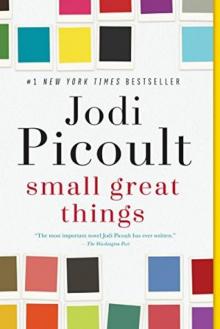 Small Great Things
Small Great Things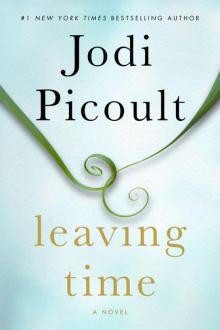 Leaving Time
Leaving Time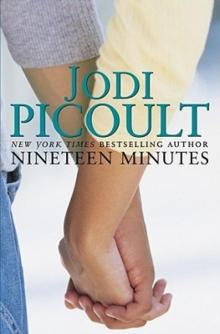 Nineteen Minutes
Nineteen Minutes Larger Than Life
Larger Than Life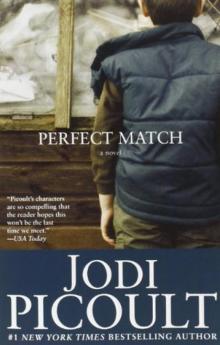 Perfect Match
Perfect Match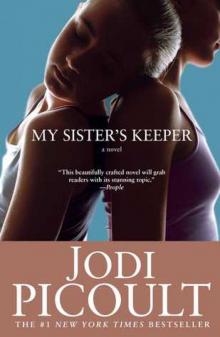 My Sister's Keeper
My Sister's Keeper The Pact
The Pact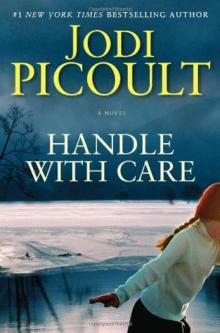 Handle With Care
Handle With Care Songs of the Humpback Whale
Songs of the Humpback Whale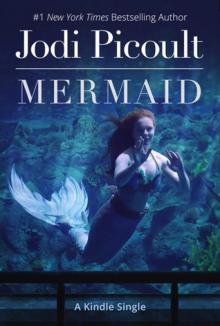 Mermaid
Mermaid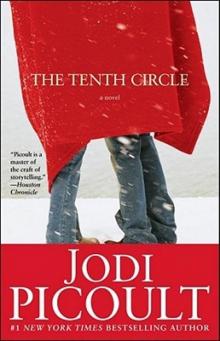 The Tenth Circle
The Tenth Circle The Color War
The Color War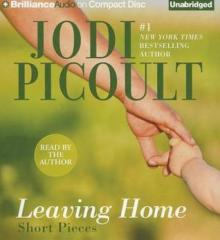 Leaving Home: Short Pieces
Leaving Home: Short Pieces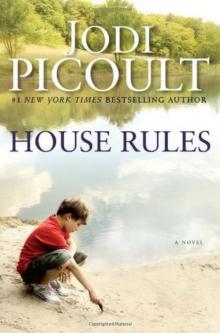 House Rules
House Rules Lone Wolf
Lone Wolf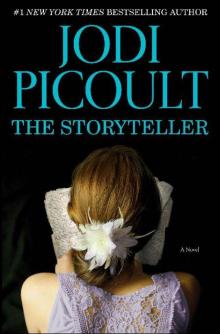 The Storyteller
The Storyteller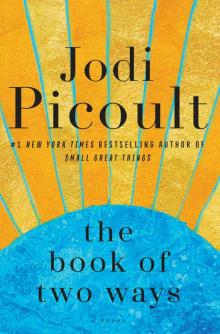 The Book of Two Ways
The Book of Two Ways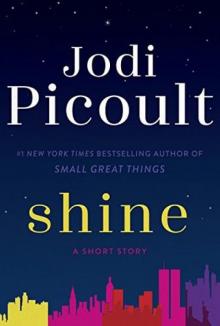 Shine
Shine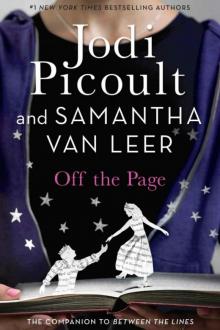 Off the Page
Off the Page Sing You Home
Sing You Home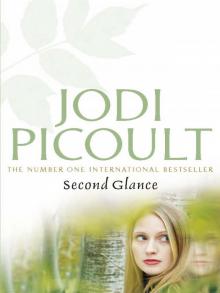 Second Glance: A Novel
Second Glance: A Novel Mercy
Mercy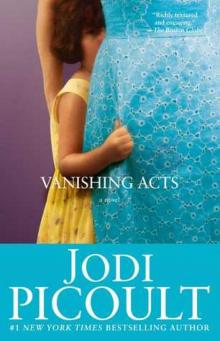 Vanishing Acts
Vanishing Acts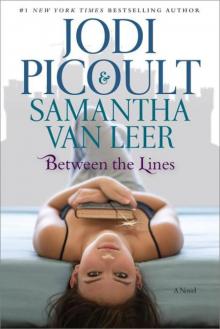 Between the Lines
Between the Lines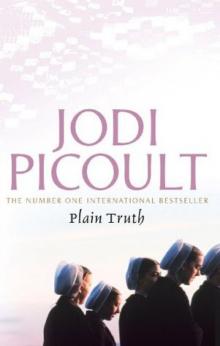 Plain Truth
Plain Truth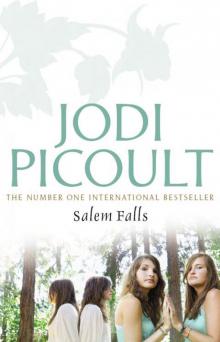 Salem Falls
Salem Falls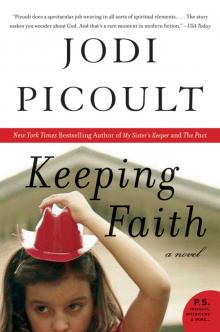 Keeping Faith
Keeping Faith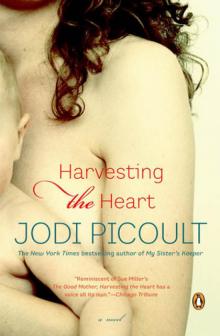 Harvesting the Heart
Harvesting the Heart Change of Heart
Change of Heart Where There's Smoke
Where There's Smoke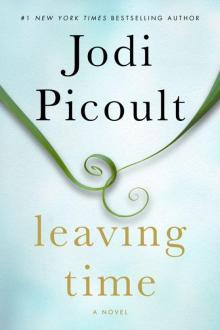 Leaving Time: A Novel
Leaving Time: A Novel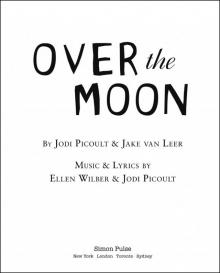 Over the Moon
Over the Moon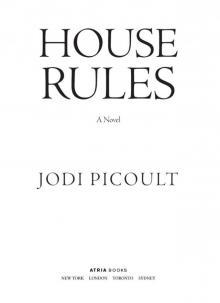 House Rules: A Novel
House Rules: A Novel The Jodi Picoult Collection #2
The Jodi Picoult Collection #2 Leaving Home: Short Pieces (Kindle Single)
Leaving Home: Short Pieces (Kindle Single)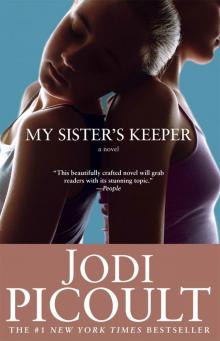 My Sister's Keeper: A Novel
My Sister's Keeper: A Novel![Mermaid [Kindle in Motion] (Kindle Single) Read online](http://i1.bookreadfree.com/i1/04/03/mermaid_kindle_in_motion_kindle_single_preview.jpg) Mermaid [Kindle in Motion] (Kindle Single)
Mermaid [Kindle in Motion] (Kindle Single)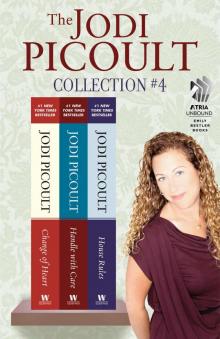 The Jodi Picoult Collection #4
The Jodi Picoult Collection #4 Sing You Home: A Novel
Sing You Home: A Novel The Jodi Picoult Collection
The Jodi Picoult Collection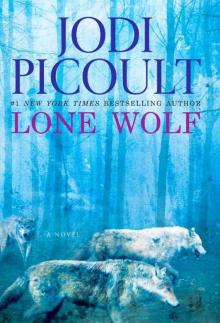 Lone Wolf A Novel
Lone Wolf A Novel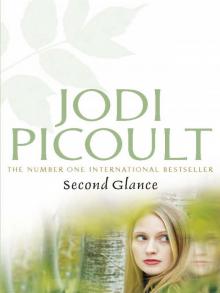 Second Glance
Second Glance Larger Than Life (Novella)
Larger Than Life (Novella) The Jodi Picoult Collection #3
The Jodi Picoult Collection #3